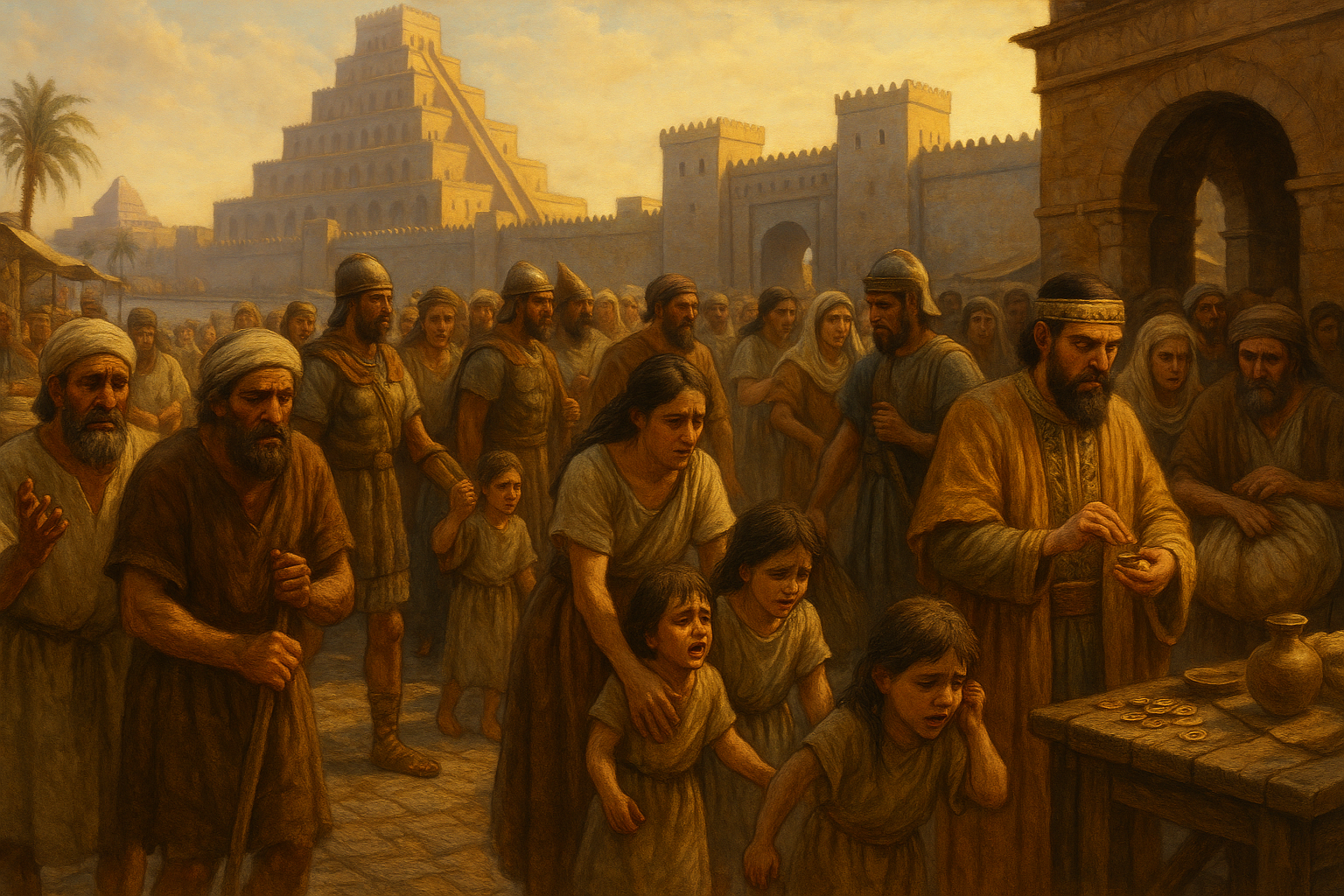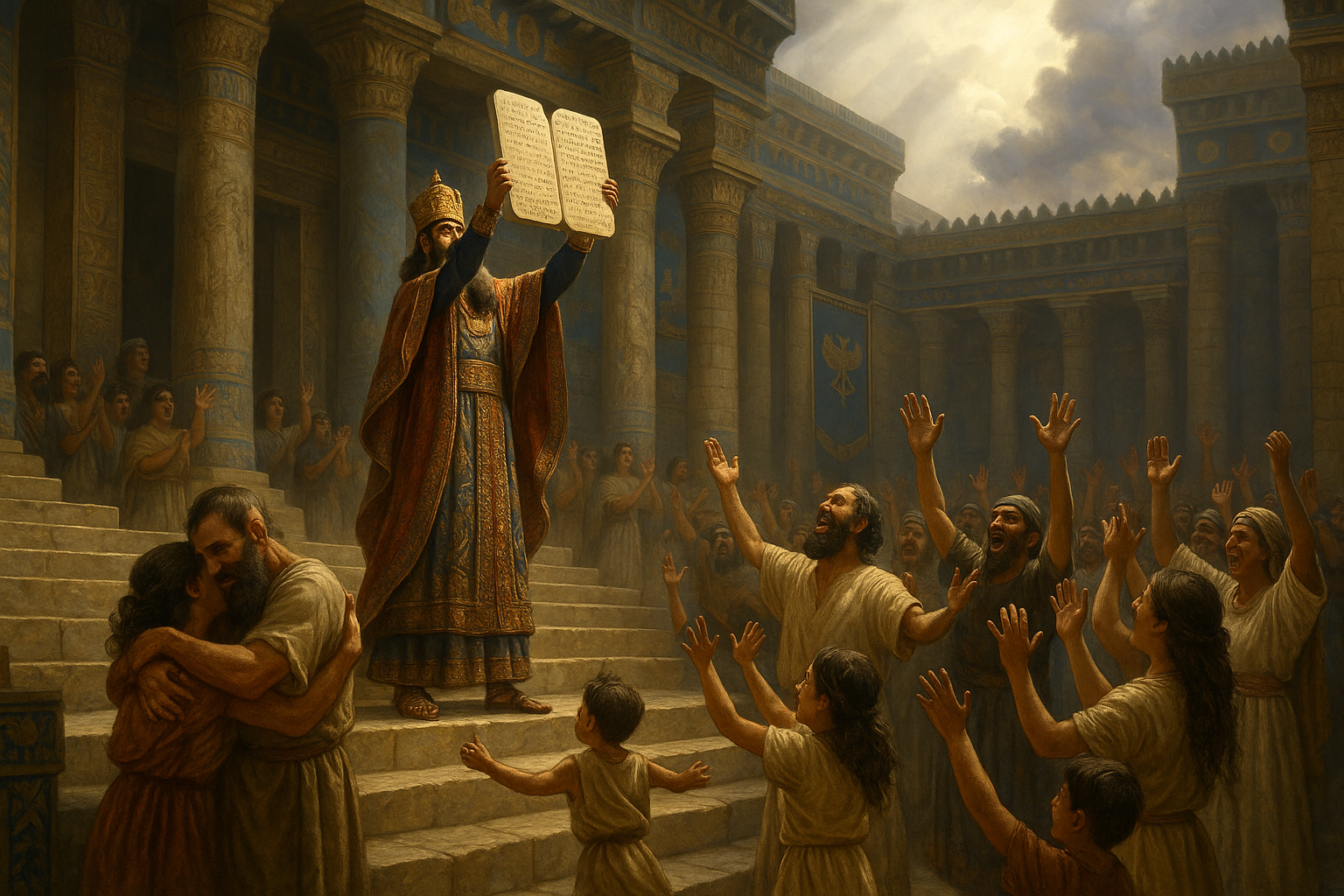From Our Favorite Historical Parallel Brother — Shamus Gerry III
The Modern Mystery
Something extraordinary happened in the marble corridors of Washington this week that would make a 4,000-year-old Babylonian king nod knowingly from his ancient throne. While Americans were debating everything from coffee prices to celebrity scandals, the U.S. Treasury Department quietly announced that our national debt had crossed a threshold that should make every citizen pause: $37 trillion dollars.
To put this in perspective, if you spent $1 million every single day since the birth of Christ, you still wouldn’t have spent $37 trillion. This isn’t just another bureaucratic milestone—it’s a number so vast it defies human comprehension, representing roughly $110,000 for every man, woman, and child in America. The interest payments alone now consume over $1 trillion annually, more than we spend on defense, education, or infrastructure.
But here’s where the story gets fascinating: this exact scenario has played out before, in stunning detail, in the cradle of civilization itself. A Mesopotamian king faced an identical crisis 3,750 years ago, and his solution was so radical, so effective, that it saved his empire and became the foundation for economic policy across the ancient world. His name was Hammurabi, and his story reads like a blueprint for what America might face in the coming years.
The Time Portal
Picture ancient Babylon around 1750 BCE, during the reign of Hammurabi. The city rises from the Mesopotamian plains like a mirage of human ambition—ziggurats piercing the sky, bustling markets filled with merchants from distant lands, and the Euphrates River carrying trade goods that made Babylon the economic heart of the known world.

But beneath this prosperity lurked a crisis that threatened everything. Walk through the city’s outer districts and you’d witness scenes that would make modern Americans uncomfortable: families torn apart by debt, children sold into bondage to pay their parents’ obligations, and once-prosperous farmers now working as slaves on land they used to own.
🔌 ENERGY INDEPENDENCE ALERT
100-Year-Old Secret Slashes Power Bills by 90%
Just like ancient Babylonians prepared for economic collapse, smart Americans are securing energy independence. Discover the forgotten technology that could free your family from rising electricity costs.
The system had started innocently enough. Mesopotamian agriculture depended on seasonal loans—farmers borrowed barley or silver in the spring to plant their crops, then repaid with interest after harvest. Interest rates were steep by modern standards, often 20-33% annually, but the fertile soil between the Tigris and Euphrates usually made repayment possible.
The Parallel Revelation
The similarities between ancient Babylon and modern America are breathtaking in their precision. Both societies created sophisticated credit systems that initially drove unprecedented prosperity. Both saw wealth concentrate in the hands of creditor classes while ordinary citizens fell deeper into debt. And both reached a tipping point where the debt burden threatened to destroy the social fabric that held the civilization together.

Hammurabi’s solution was breathtaking in its scope and audacity. He proclaimed what the Sumerians called “amargi”—literally meaning “return to mother,” or freedom. In a series of royal edicts issued four times during his 40-year reign, he canceled all personal debts owed to the government, high officials, and private creditors. Debt-slaves were freed and returned to their families. Land that had been forfeited to creditors was returned to its original owners. In essence, he hit the reset button on his entire economy.
The Pattern Recognition
What makes this story so relevant to modern America isn’t just the surface similarities—it’s the underlying pattern that repeats throughout human history. Civilizations rise by creating credit systems that fuel growth and innovation. But credit systems inevitably evolve into debt traps that concentrate wealth and power in the hands of creditor classes. Eventually, the debt burden becomes so overwhelming that it threatens the civilization’s survival.
The Ancient Warning
Hammurabi’s debt cancellations weren’t acts of charity—they were calculated moves to save his civilization. Archaeological evidence shows that his “Clean Slate” proclamations restored agricultural productivity, increased tax revenues, and strengthened his military by returning free citizens to the ranks. The policy was so successful that it became standard practice throughout the ancient Near East.
But the story also contains a warning that should chill modern Americans. Civilizations that failed to address their debt crises didn’t survive. The later Roman Empire, which abandoned debt forgiveness in favor of creditor rights, eventually collapsed under the weight of its own financial contradictions.
5 Things Readers Can Do This Week
While we can’t control federal debt policy, we can learn from Hammurabi’s wisdom and prepare our families for potential economic disruption. Here are five practical steps inspired by ancient Mesopotamian survival strategies:
First, build food security like ancient Babylonians did. Start a survival garden using proven techniques from Survival Stronghold, focusing on crops that store well and provide complete nutrition.
Second, develop self-reliance skills that transcend monetary systems. The Self Reliance Report offers practical guides for essential skills like water purification, basic medical care, and home repair.
Third, consider homesteading strategies that reduce your dependence on debt-based systems. Homesteader Depot provides resources for growing your own food, generating your own power, and creating sustainable living systems.
Fourth, prioritize your health to avoid the medical debt that bankrupts so many American families. Freedom Health Daily offers natural health strategies that can reduce your dependence on expensive medical interventions.
Finally, explore holistic approaches to wealth and security that go beyond monetary accumulation. Seven Holistics teaches integrated approaches to prosperity that consider physical, mental, and spiritual well-being alongside financial health.
🌱 FOOD SECURITY BREAKTHROUGH
The 4ft Farm Blueprint: Feed Your Family from Your Backyard
Ancient civilizations survived economic collapse by controlling their food supply. Modern families can do the same with this revolutionary micro-farming system that produces massive harvests in minimal space.
The ancient Babylonians understood something we’ve forgotten: true security comes not from accumulating debt-based assets, but from building resilient communities and practical skills that survive economic upheaval. Hammurabi’s debt cancellations worked because they restored people to productive land and meaningful work.
History doesn’t repeat, but it rhymes with stunning precision. The $37 trillion debt milestone isn’t just a number—it’s a 4,000-year-old warning written in cuneiform on clay tablets, waiting for us to remember the lessons our ancestors learned the hard way.
